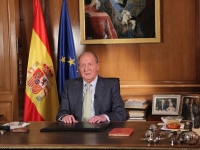Politics
A year met the abdication of King Juan Carlos I of Spain
On June 2, 2014
USPA NEWS -
This June 2 a year after the announcement of the abdication of King Juan Carlos I of Spain is fulfilled in his son, the then Prince of Asturias Felipe de Borbón. The formal act of transfer of the Crown took place on June 18 at the Royal Palace of Madrid and the proclamation of Felipe VI, June 19.
The news of the abdication as King Juan Carlos I of Spain was leaked by the Spanish Prime Minister, Mariano Rajoy, and confirmed hours later by the King himself through a televised address to the nation. During that morning and even in the days before, rumors ran through the editors of the Spanish media: something was brewing and it was important. The resignation of Juan Carlos I, King who led the Spanish transition from dictatorship to democracy, which aborted the attempted coup of February 23, 1981 and appeared repeatedly in surveys as the most valued political figure by the Spaniards, however it came at a time of low popularity of the monarch.
His poor health, with successive operations; their mistakes, such as hunting in Botswana whose image, hunting elephants, went around the world; family problems, his middle daughter, the Infant Cristina, the courts; and convinced that to guide the country into a new time, deal with secessionist challenges and connect with new generations of Spaniards was necessary to rejuvenate the monarchy, he was convinced to take the important step of giving up the Crown.
Juan Carlos I de Borbón had acceded to the throne on November 22, 1975, two days after the death of dictator Francisco Franco. Named successor by Franco himself, soon showed signs that his reign would not be a continuation of the dictatorship. Supported by the first President of democracy, Adolfo Suarez, and with the help, sometimes visible and other hidden, of a generation of politicians who prefaced the interest of Spain as his own interest, that a few years later would be president Government, Felipe Gonzalez, or the secretary general of the Communist Party of Spain, Santiago Carrillo, King Juan Carlos to implant democracy in Spain.
In that effort also he had the unconditional support of his wife, Queen Sofia. Today, the marriage seems remote, although both maintain a service representative to schedule the new monarchs. Juan Carlos and Sofia maintain the King's condition, but in the year since the abdication have managed to stay in the background. Even among the Spaniards, more focused now on King Felipe VI. The new monarch decided to cut any dependence of the institution to people or issues that could jeopardize his reign and thus reduced the royal family himself; Queen Letizia; the Princess of Asturias, Leonor de Borbón, and the Infant Sofia; and emeritus Kings Juan Carlos and Sofia. Outside were the sisters of the King.
Liability for this article lies with the author, who also holds the copyright. Editorial content from USPA may be quoted on other websites as long as the quote comprises no more than 5% of the entire text, is marked as such and the source is named (via hyperlink).






